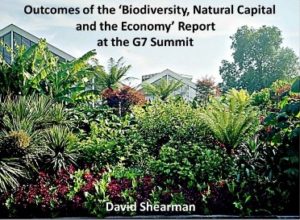
Following Australia’s extravagant claims to climate leadership at the G7 summit, hopes for a more diplomatic approach were dashed by a Prime Ministerial statement claiming that “Australia is a frontrunner when it comes to taking action to conserve our biodiversity”.
Nevertheless the Biodiversity Report of the G7 was recognised by many as an important signpost for humanity. The recent G7 summit aimed to help the world build back better from the COVID- 19 pandemic and create a greener, more prosperous future.
Leaders noted that the Report prepared by the OECD provided policy guidance for Ministries to underpin transformative domestic and international action to halt and reverse biodiversity loss.
After the meeting, the Carbis Bay G7 Summit Communique said:
“ Biodiversity loss is an intrinsically link- ed, mutually reinforcing, and equally important existential threat to our planet and our people in alongside climate change. In this context, we acknowledge as the G7 our contribution to the decline of biodiversity and pledge to play our part in its restoration and conservation. We support an ambitious post-2020 global biodiversity framework to be adopted by parties at COP15 which sets ambitious goals, strengthens implementation, and enhances regular reporting and review.
“ We acknowledge our responsibility to support the world in reversing the trajectory of the loss of biodiversity and the natural environments that support it, alongside ensuring that the impact on nature is fully taken into account in our policy decision making.”
Seeing the difficulties ahead, The Economist noted:
“The biodiversity crisis poses as great a risk to human societies as does climate change. Yet it has only a fraction of the public profile. In part that is because the loss of biodiversity cannot be neatly quantified, as climate change can, into parts per million of carbon dioxide, or degrees above pre-industrial average temperatures. And the webs that link species within and across ecosystems are even more complex than the processes that drive climate change”.

The G7 adopted conserving or protecting at least 30 per cent of global land and at least 30 per cent of the oceans by 2030 to help stem the extinction crisis, safeguard water and food supplies, absorb carbon pollution, and also reduce the risks of future pandemics. The targets were called “ambitious and effective global biodiversity targets” though their link to biodiversity retention is sometimes tenuous.
In 2020 the Australian federal government refused to sign a global pledge endorsed by 64 countries committing them to reverse biodiversity loss. Then immediately after G7, the prime minister indicated that Australia had joined the international High Ambition Coalition of countries committed to conserve 30 per cent of the world’s land and sea in order to halt the loss of biodiversity.
In a repeat performance of his claim to leadership on climate change ahead of many other countries the Australian prime minister said:
“ Australia is a frontrunner when it comes to taking action to conserve our biodiversity…”
Clearly Orwell’s Ministry of Truth is working hard in Australia and not only on fudging emissions data.
The other measures proposed in the Biodiversity Report may be of more moment;- support for the transition to sustainable management and use of natural resources; ensuring prominence of nature in both policy and economic decision-making; strengthening the accountability and implementation mechanisms of Multilateral Environmental Agreements; and most importantly international trade.
International trade has been recognised as essential for sustainable development. It can generate overall economic development and employment, and bolster the types of development that have positive effects on biodiversity – when local conditions provide higher yields without habitat loss. However international trade may also have many negative impacts on biodiversity.
Under such considerations the current UK/Australia trade deal might have included examination of the role of Australia’s continued land clearing in producing beef which is competitive in the UK market. Australia has 28 million cows and a wish to export, but at what environmental cost to biodiversity, land and climate change and water usage? In full cost accounting Australian beef might be prohibitively expensive.
The omens for environmental sustainability in the current UK /Australia trade deal are poor. Secrecy has become a tradition of trade deals to the ire of the Productivity Commission and Federal Parliament’s joint standing committee on treaties where some concerns relate to inclusion of Investor State Dispute Settlement (ISDS) rules which give to foreign companies rights unavailable to local companies. Thus they can claim $billions in compensation through an extraterritorial tribunal if they believe their rights have been infringed by health and environmental laws.
The continued existence of the ISDS epitomises the indifference of most leaders of growth economies to the demise of biodiversity and ecological services. The task before humanity is the enlightenment of minds before rules to ensure environmental sustainability can be respected. As we saw recently, Trade Deals such as that between the UK and Australia, present countless opportunities for national leaders to proclaim their prowess in producing economic growth accompanied by much back slapping and adulation etc.

In this case both leaders badly needed the deal, Boris Johnson because of the UK’s considerable loss of its exports to the EU and Scott Morrison because of his wish to be accepted onto the Big Boys international stage. Biodiversity was lost to ambition on this occasion.
The greatest reprieve for biodiversity would be in the recognition of the cost of destructive action of coal and gas mining from direct damage to land, water resources, and as a cause of climate change. Add to this the fossil fuel subsidies in Australia which reach- ed A$10.3 billion last financial year.
Thermal coal for export would then cease under full cost accounting and the drive to cheaper, cleaner energy would be enhanced.
The Biodiversity Report points out the need to identify budgetary transfers harmful to biodiversity or the environment more broadly and is a necessary step to implement reform. Very few countries have undertaken national level assessments to systematically identify harmful subsidies to biodiversity or the environment more generally apart from France, Germany and Italy
The Biodiversity Report is important because it provides an insight into the fundamental causes of the crisis. It indicates to us that although we are deflected by fighting to preserve threatened species, we must also direct our energy to the engine rooms of destruction – treasury and economic policy.
Currently the spectre of climate change can be epitomized as an express train accelerating to disaster whilst government is seated on the slow train of action arguing over meal service and stopping at every station, but at least it is moving. By contrast government has only just recognised that the fast train of environmental demise is nearing the end of its journey. They have boarded another slow train but it is stuck in the station while they try to work out how its coal fired steam engine works. For train spotters the name plate on the engine is “Gaia”.
Source: Pearls & Irritations, 25 June 2021 https://johnmenadue.com/the-g7-report-on-biodiversity-natural-capital-and-the-economy
With the permission of Dr David Shearman who is Emeritus Professor of Medicine at the University of Adelaide and is an ERA patron.






























